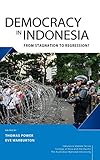Democracy in Indonesia : From Stagnation to Regression? / ed. by Eve Warburton, Thomas Power.
Material type: TextPublisher: Singapore : ISEAS Publishing, [2020]Copyright date: ©2020Description: 1 online resource (420 p.)Content type:
TextPublisher: Singapore : ISEAS Publishing, [2020]Copyright date: ©2020Description: 1 online resource (420 p.)Content type: - 9789814881517
- 9789814881524
- Democracy -- Indonesia -- Congresses
- Democracy--Indonesia
- Democracy
- Elections -- Indonesia -- Congresses
- Indonesia--Politics and government
- Populism -- Indonesia -- Congresses
- Social change -- Political aspects -- Indonesia -- 21st century
- Political Ideology
- POLITICAL SCIENCE / Political ideologies / Democracy
- 320.9598 23
- DS644.5 .I528 2019
- DS644.4 .I41 2020
- online - DeGruyter
| Item type | Current library | Call number | URL | Status | Notes | Barcode | |
|---|---|---|---|---|---|---|---|
 eBook
eBook
|
Biblioteca "Angelicum" Pont. Univ. S.Tommaso d'Aquino Nuvola online | online - DeGruyter (Browse shelf(Opens below)) | Online access | Not for loan (Accesso limitato) | Accesso per gli utenti autorizzati / Access for authorized users | (dgr)9789814881524 |
Frontmatter -- Contents -- Tables and figures -- Contributors -- Foreword -- Acknowledgments -- Glossary -- 1 The decline of Indonesian democracy -- Part 1 Historical and Comparative Perspectives -- 2 Indonesia’s democracy in a comparative perspective -- 3 Indonesia’s tenuous democratic success and survival -- Part 2 Polarisation and Populism -- 4 How polarised is Indonesia and why does it matter? -- 5 Divided Muslims: militant pluralism, polarisation and democratic backsliding -- 6 Is populism a threat to Indonesian democracy? -- 7 Islamic populism and Indonesia’s illiberal democracy -- Part 3 Popular Support for Democracy -- 8 Electoral losers, democratic support and authoritarian nostalgia -- 9 How popular conceptions of democracy shape democratic support in Indonesia -- Part 4 Democratic Institutions -- 10 Indonesian parties revisited: systemic exclusivism, electoral personalisation and declining intraparty democracy -- 11 The media and democratic decline -- 12 The economic dimensions of Indonesia’s democratic quality: a subnational approach1 -- 13 A state of surveillance? Freedom of expression under the Jokowi presidency -- Part 5 Law, Security and Disorder -- 14 Assailing accountability: law enforcement politicisation, partisan coercion and executive aggrandisement under the Jokowi administration -- 15 In the state’s stead? Vigilantism and policing of religious offence in Indonesia -- 16 Rumour, identity and violence in contemporary Indonesia: evidence from elections in West Kalimantan -- 17 Electoral violence in Indonesia 20 years after reformasi -- Index
restricted access online access with authorization star
http://purl.org/coar/access_right/c_16ec
Indonesia has long been hailed as a rare case of democratic transition and persistence in an era of global democratic setbacks. But as the country enters its third decade of democracy, such laudatory assessments have become increasingly untenable. The stagnation that characterized Susilo Bambang Yudhoyono’s second presidential term has given way to a more far-reaching pattern of democratic regression under his successor, Joko Widodo. This volume is the first comprehensive study of Indonesia’s contemporary democratic decline. Its contributors identify, explain and debate the signs of regression, including arbitrary state crackdowns on freedom of speech and organization, the rise of vigilantism, deepening political polarization, populist mobilization, the dysfunction of key democratic institutions, and the erosion of checks and balances on executive power. They ask why Indonesia, until recently considered a beacon of democratic exceptionalism, increasingly conforms to the global pattern of democracy in retreat.
Mode of access: Internet via World Wide Web.
In English.
Description based on online resource; title from PDF title page (publisher's Web site, viewed 27. Jan 2023)


